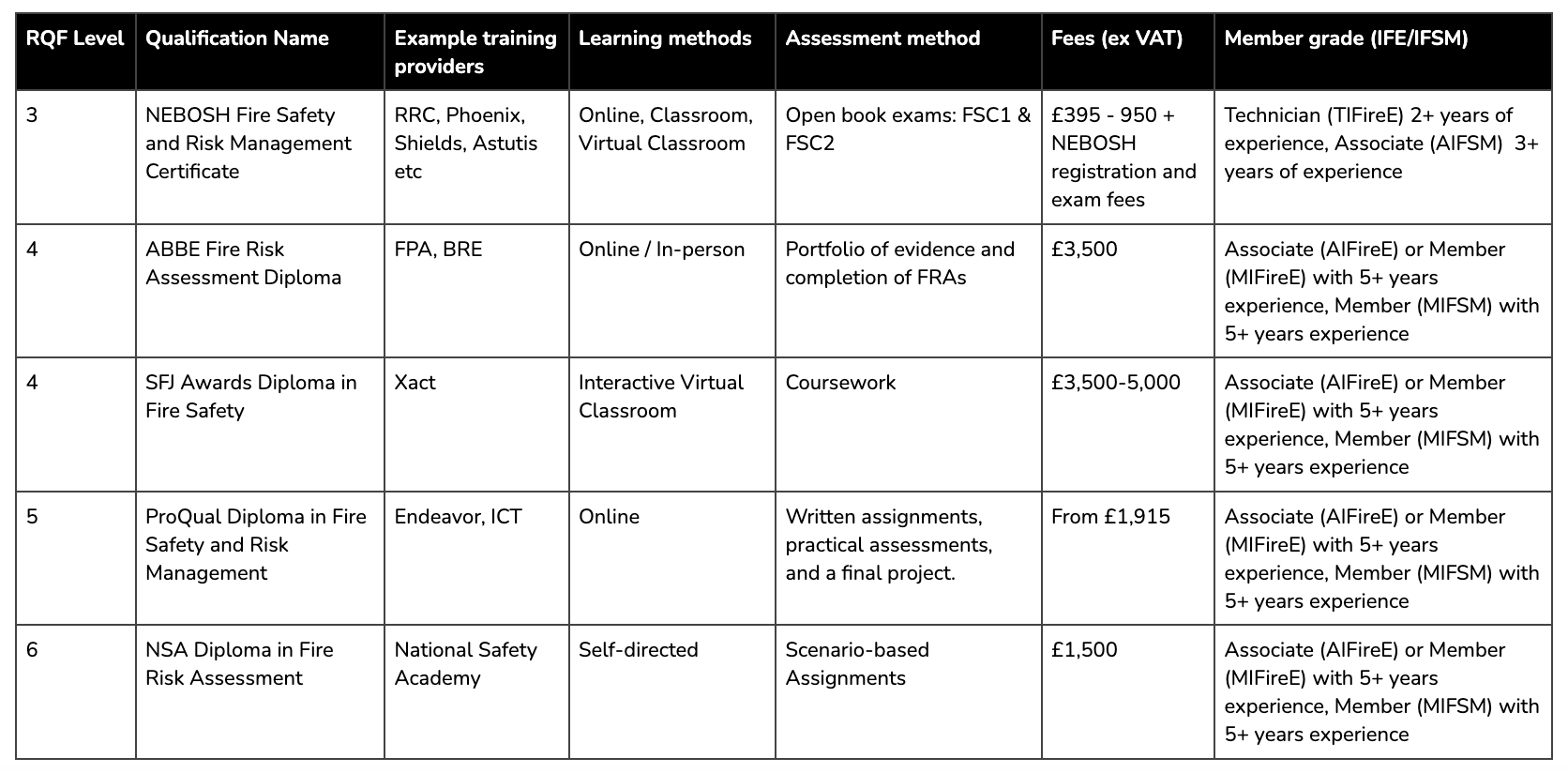Which is the best fire risk assessment course?
When it comes to fire safety, having the right qualifications is essential - whether you're a facilities manager, fire risk assessor, or health and safety professional. With different awarding bodies, levels, and learning methods available, choosing the course most suited to you can be overwhelming. Let’s compare the most popular fire safety qualifications to help you decide on the next step in your career.
Comparison of different fire risk assessment qualifications
The main differences lie in the learning delivery, assessment methods, and qualification levels.

Which qualification level is right for me?
Some courses are better suited for beginners, while others are designed for experienced professionals looking to advance their careers.
If you’re just starting out, a Level 3 course will give you the basics of fire safety but will limit your ability to conduct fire risk assessments to just the most basic of premises.
If you’re aiming to become a fire safety professional or consultant, you’ll want to be looking at a minimum of a level 4 diploma for medium risk premises, and for everything up to high risk you will need to study the NSA Level 6 Diploma in Fire Risk Assessment. This starts by covering the foundations - such as fire science and behaviour - and builds upon it step-by-step to result in comprehensive coverage of a variety of premises, including some ‘high-risk’ buildings.
What's the best learning method?
Not everyone learns in the same way - some thrive in structured classrooms, while others need the freedom to study at their own pace.
For example, the ABBE Fire Risk Assessment Diploma is offered in a classroom setting and takes place on distinct dates. Online and self-paced options allow you to fit study around work commitments. The NSA Diploma takes this further with no fixed start dates or deadlines, making it ideal for busy professionals.
How are learners assessed?
As you might remember from school, how you’re assessed can make a big difference to your success. Some people prefer the pressure of in-person examinations, whereas others find coursework or real-life practical scenarios are more suited to them.
NEBOSH uses open-book exams, while ABBE relies on traditional exams, so these are good options if you perform well under timed conditions. The NSA Diploma is entirely assignment-based, using real-world scenarios - ideal for those who prefer to work on their assessments in their own time, in their preferred environment.
How much does a fire risk assessment qualification cost?
Investing in a qualification is a big decision, so cost matters, and price and quality can vary greatly depending upon the chosen training provider. For example, although NEBOSH qualifications can be found pretty cheaply through some training providers, with the addition of registration and exam fees you can easily be set back by an additional £400+ - and that's before paying for any resits of their exams, which can be up to £150+VAT per exam.
NSA qualifications are exclusively delivered by us to ensure consistency in quality, and offer strong value compared to competitors. Those that need to resit one of our assessments will just need to pay the resubmission fee of £35+VAT.
NSA qualifications are exclusively delivered by us to ensure consistency in quality, and offer strong value compared to competitors. Those that need to resit one of our assessments will just need to pay the resubmission fee of £35+VAT.
Professional membership and accreditation with IFE and IFSM
All these qualifications can help you gain IFE (Institution of Fire Engineers) or IFSM (Institute of Fire Safety Managers) membership, but the grade you achieve depends on the level of qualification and your relevant experience.
The NEBOSH Certificate in Fire Safety and Risk Management can lead to Technician with IFE (TIFireE) or Associate with IFSM (AIFSM) after gaining experience. L4-L6 Diplomas can fast-track you to Associate or Member grade of IFE (AIFireE/MIFireE) and Member grade of IFSM (MIFSM) with sufficient experience.
In summary...
There’s no one-size-fits-all approach to learning about fire risk assessment. What matters most is finding a course or pathway that suits your learning style and helps you develop into a confident, competent professional. Whether it’s with NSA or another provider, choosing the right training for you is the key step toward making a real impact in fire safety.
Sign up to our mailing list now!
Be the first to hear about new courses, access exclusive discounts, and more.
Thank you!
National Safety Group Limited t/a National Safety Academy
registered in England and Wales company number 15882393
Copyright © 2025

